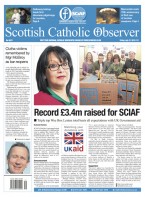February 21 | ![]() 0 COMMENTS
0 COMMENTS ![]() print
print

Communities in South Sudan at risk of starvation as fighting continues after ceasefire
A senior Church figure warned entire communities in South Sudan are at risk of starvation, as fighting continues in the world’s newest country despite a supposed ceasefire.
Mgr Roko Taban Mousa said vast numbers of people are ‘in urgent need’ across his diocese of Malakal which covers Upper Nile, Unity and Jonglei states, scenes of some of the worst fighting between government forces and rebel groups.
Speaking last week from South Sudan in an interview with the charity Aid to the Church in Need, Mgr Taban warned of mass famine if aid, particularly food, is not sent quickly. Describing the difficulties of getting aid to the worst-affected areas, he said that, in spite of the ceasefire of January 24, the fighting had continued, although the conflict was not as intense as before.
“The question of food is very urgent,” he said. “People are on the edge of starvation and, if nothing happens, people will fall into that situation. Upper Nile, Bor and Unity are really destroyed. This conflict has been devastating and very inhuman.”
Mgr Taban, who is Apostolic administrator of Malakal, said that in some of the worst affected areas of his diocese, up to 100,000 people are in dire need of food. He also said at least 30,000 homes lie in ruins across the diocese, half of them in three main towns, Bor, the centre of particularly severe conflict, Malakal and Bentiu.
The monsignor said people had no access to healthcare at a time when malaria and diarrhoea were on the rise and reported that people without clean water were drinking from the White Nile that runs through the diocese.
Across South Sudan, thousands of people have died in the conflict between South Sudan government forces and rebels led by former deputy president Riek Machar. The UN has reported that since the violence started on December 15 2013 more than 860,000 people have fled their homes. Stressing that the devastation was far worse than during the catastrophic 21-year civil war that ravaged Sudan until 2005, Mgr Taban said ‘what we experienced during the [civil] war was never as bad as what we have experienced these past weeks.’
“People need to pray for us,” he said. “We feel that sense of solidarity when people pray. The need for prayer is very important. For those who have suffered so much, knowing that there are people who are praying for them will encourage them and give them back their hope.”
Aid to the Church in Need is working with Mgr Roko to assess options for emergency aid.
“The charity is willing to offer emergency help but we would first like to raise the question of logistical capacity; whether there are trained personnel capable of implementing the project efficiently,” Christine du Coudray Wiehe, ACN’s Sudan and South Sudan projects coordinator, said.
—This story ran in full in the February 21 edition print of the SCO, available in parishes.











